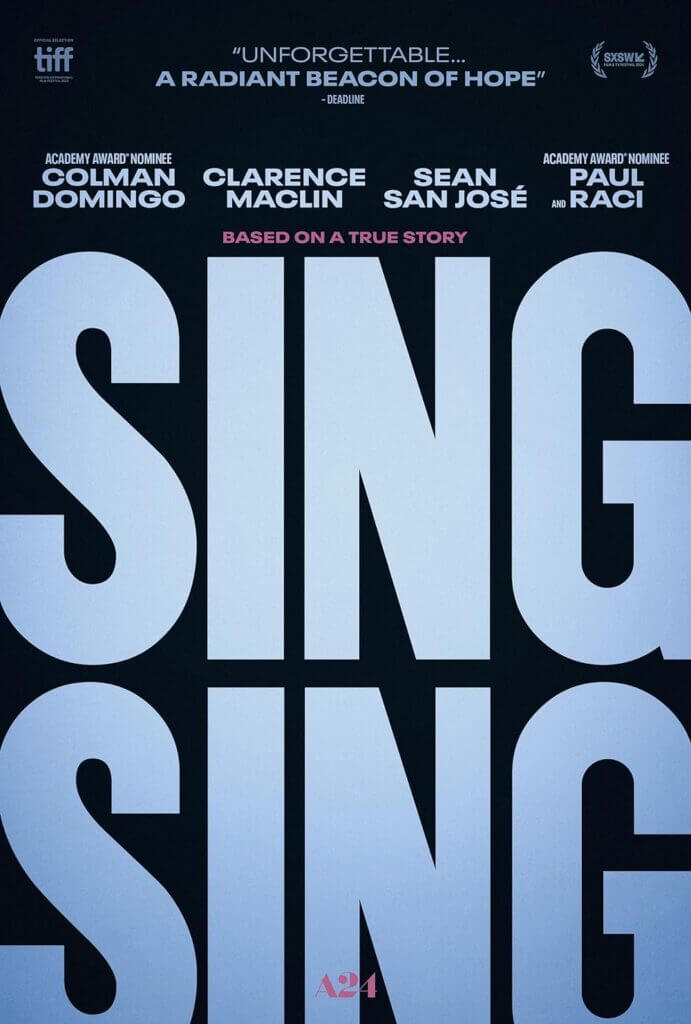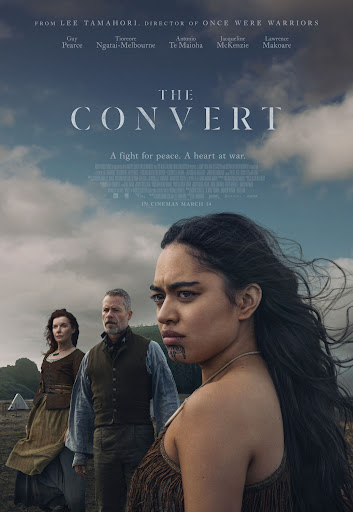
MSPIFF 2024 – Dispatch 1
These films were screened at the 43rd Minneapolis St. Paul International Film Festival (MSPIFF43), which runs from April 11-25. Check here for the full lineup, and check back for additional dispatches. Select films reviewed below will receive separate full-length writeups, some for their wider release, some exclusive to Patreon. In the meantime, here are some first impressions.
 Sing Sing
Sing Sing
The opening night film of any festival can set the tone for the days and weeks to come. For MSPIFF43, Sing Sing draws out feelings of profound empathy where little is usually reserved by society. Greg Kwedar’s new feature showcases the Rehabilitation Through the Arts (RTA) prison program that allows those inside to express themselves creatively and, in doing so, heal. The film was based on an Esquire article titled “The Sing Sing Follies” by John H. Richardson, and it features a group of inmates staging an original play, Breakin’ The Mummy’s Code, written by RTA facilitator Brent Buell into a bizarre blend of time travel, Shakespeare, and various genres in which cowboys, pharaohs, and gladiators share the stage with Hamlet and Freddy Krueger.
Kwedar’s film adopts a documentary-style realism to capture the real-life stories of those involved. The aesthetic, shot on film with a single camera by cinematographer Pat Scolar, roams around prison spaces and intimately frames their lives, using a grainy, dusty film stock and what appears to be natural light. The production was filmed in the decommissioned Downstate Correctional Facility in New York State, which closed in 2022, giving further authenticity to Sing Sing along with the cast, many of whom were formerly incarcerated.
Central to the film is Colman Domingo, who plays John “Divine G” Whitfield, a creative who was wrongly convicted of a crime in the 1980s (the real Divine G has since been released). Divine G helps coordinate RTA productions at Sing Sing Correctional Facility in New York, alongside Bruell (Paul Raci, from 2020’s Sound of Metal). Much of the narrative involves the mounting of the production, which is complicated by the arrival of a new face, Clarence “Divine Eye” Maclin (playing himself), a former drug dealer who must acclimate to his new surroundings in the theater group. Apart from Domingo, Raci, and a memorable role by Sean San José, the performances throughout the film have an unpolished quality that nonetheless makes them feel authentic and powerfully rendered. Each of these men grapples with their situation, engaging in drama therapy to work through their internal issues, some of which come spilling out during rehearsals.
The festival’s leadership arranged for political leaders from the Minnesota community to speak before the screening. Attorney General Keith Ellison spoke passionately about Minnesota’s RTA programs as part of humanist prison reform that emphasizes the “correctional” aspect of correctional facilities. These programs reinforce both “accountability and creativity,” in Ellison’s words, reminding those persons convicted of a crime that they’re still human beings who, eventually, will have to be reintegrated into society. The speakers also highlighted the Minnesota Rehabilitation and Reinvestment Act, which helps to reduce sentences by as much as half for incarcerated persons who participate in the RTA program and show they can contribute to society, specifically through the arts.
Watching the film through that lens imbued Sing Sing with even more social significance, though some of how the filmmaker handles the dramaturgy and narrative structure proves maudlin instead of natural. There’s a leap in time in the end that registers as though Kwedar felt compelled to end Sing Sing on a crowd-pleasing note. And while undeniably effective (I was in tears), the moment felt somewhat randomly inserted into the rest of the story. But that shouldn’t diminish the film’s overwhelming emotional power, nor many of its incredible performances. A24, the distributor, has plans to release the film over the summer, and one cannot help but wish they delay the release until the fall, when awards voters will consider Domingo, who is marvelous here and carries the film’s big heart. 3.5/4 Stars
 The Movie Teller
The Movie Teller
My second film of the festival pairs nicely with Sing Sing; though, it’s about the therapeutic quality of cinema instead of theater. After all, what film festival would be complete without an offering about the transportive magic of cinema? It’s familiar territory for Lone Sherfig, helmer of the delightful Their Finest (2016), about British creatives hired by the Ministry of Information to produce propaganda films during World War II. The Danish filmmaker once again tackles movie love against a volatile backdrop with The Movie Teller, a lovingly made and beautifully shot testament to the transportive effect of storytelling and escapism.
Opening in a small Chilean town near the desert of Atacama in the 1960s, the narrative unfolds against a period of change in the country, when an isolated saltpetre mining community watches as the romanticism of cinema’s golden age transitions to television and, eventually, the rise of Pinochet. The tale introduces Medardo (Antonio de la Torre), a modest miner who lives in company housing and takes his dreamer wife (Bérénice Bejo) and their four children to the cinema every Sunday. When he’s injured in a work accident, the family must pinch pesos and send only one family member to the cinema each week, requiring them to come back and retell the movie in a living room performance.
The Movie Teller is bookend narrated by the protagonist, María Margarita (Alondra Valenzuela as a child, Sara Becker as an adult, both excellent), the titular character and family’s only daughter, who excels at acting out what she has seen. María’s performances drive several playful sequences with a touch of whimsy, such as her scrappy productions of Spartacus (1960) and other popular films from the era, each filled with moments of imagination come to life. Eventually, someone gets the idea to sell tickets to María’s performances.
Sherfig, adapting the 2009 book by Hernán Rivera Letelier, delivers moments of imagination and creativity. They establish a “print the legend” theme in the film, taken from The Man Who Shot Liberty Valance (1962) and its notion that people prefer a cathartic fantasy over reality. Take when María goes to watch The Apartment (1960) and sees her mother in the Shirley McClaine role, feeling trapped by her obligations and self-sabotaging love for the wrong man. To be sure, the film blends the messy reality of unhappy characters, exploitative working conditions at the mine, and a country approaching collapse with the waning influence of movies. For her part, María spends much of her life escaping reality, whereas her mother, too, needs something else, including an affair with Medardo’s boss (Daniel Brühl). Bejo’s character soon resolves to leave her family behind, and gradually, María begins to understand her mother’s need for something more, even if they never reconcile.
Not everything in The Movie Teller works out like a Hollywood movie for these characters, evidenced by how the escapist magic of the film’s first half descends into a confrontation with reality in the second. But the vibrant characters and performances by Valenzuela and Becker, along with Sherfig’s blend of desolate and dreamy images captured on location in Chile, make for an experience that reminds us why we love and need to live in someone else’s shoes, even if it’s only for two hours. 3/4 Stars
 The Convert
The Convert
Born to a Maori father and British mother, the New Zealand director Lee Tamahori has split his career between stories about the effects of his country’s history with colonization and straightforward Hollywood fare. His breakthrough came in 1994 with the impassioned drama Once Were Warriors, about a troubled section of urban Maori in South Auckland, where domestic violence and substance abuse run rampant. After that, Tamahori became a studio franchise director for much of the 1990s and early 2000s, contributing entries to the James Bond, XXX, and Alex Cross series. Lately, he’s been returning to his roots with stories about Maori in Mahana (2016), a drama set in the 1950s, and now The Convert.
The director’s latest considers the pre-colonial period of New Zealand’s history in the 1830s, involving a solder-turned-minister, Thomas Munroe (Guy Pearce, solid), whose passage to the British settlement of Epworth is paid for by its citizens. They build him a home and church, expecting his spiritual guidance. But when the sympathetic Munroe sees how callously his countrymen treat the local Maori as subhumans—specifically, a young woman named Rangimai (Tioreore Ngatai-Melbourne), who becomes Munroe’s ward—he turns away from them and instead becomes involved in a turf war between two tribes. Introspective and filled with regrets about his time as a soldier, Munroe is the white savior who joins the community’s fight in a dynamic recalling Dances with Wolves (1990) and The Last Samurai (2006).
The resulting battle sequences are shot competently, with gorgeous location work captured on foggy, other-worldly New Zealand islands. But they lack a certain vitality that would give this well-worn scenario new life. Based on the 2011 book Wulf by Hamish Clayton, the film takes a different track from, say, Martin Scorsese’s Silence (2016), which finds nobility in defiantly preserving faith when it’s unwanted by many of the indigenous people. Munroe doesn’t outright adopt the Maori way, either, preferring to find harmony between his beliefs and his respect for the tribe’s independence. Harmony, of course, would be impossible after the British government declared New Zealand a colony, confiscated Maori land, and oppressed its people. The Convert yearns for understanding between the two cultures, even while acknowledging that history may prove that impossible. 2.5/4 Stars





